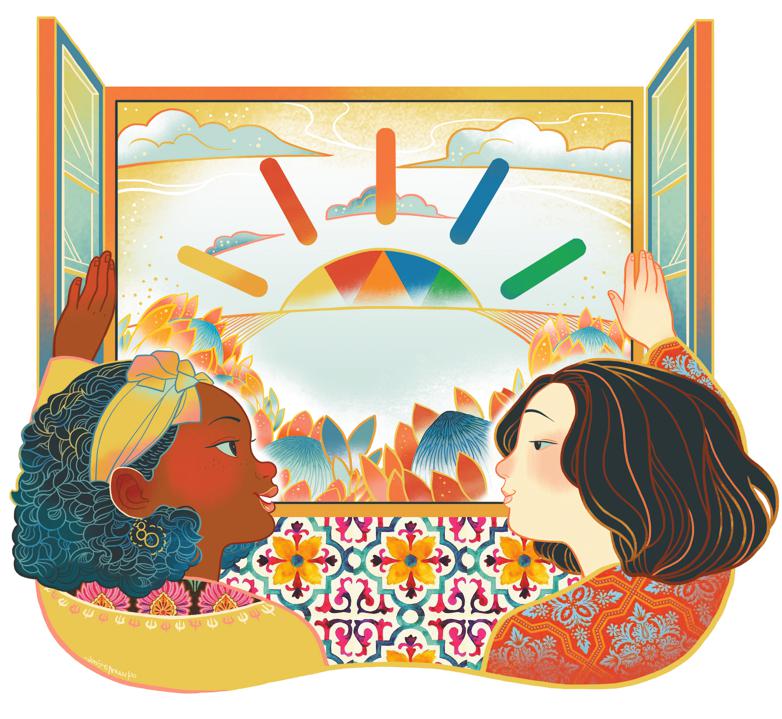By AMANUEL MESFUN Source:China Daily 2024-08-24

LI MIN/CHINA DAILY
As world leaders prepare to gather in Beijing from Sept 4 to 6 for the 2024 summit of the Forum on China-Africa Cooperation, there is a palpable sense of anticipation about the potential outcomes of this crucial meeting. Held after a six-year hiatus, this year's FOCAC Summit is a routine diplomatic event, but also a pivotal moment for reinforcing the longstanding friendship between China and Africa.
The stakes are exceptionally high in these times of significant global shifts and challenges — from rising anti-globalization sentiments to pressing geopolitical conflicts and climate change. These global crises present unprecedented challenges, putting human society at a crossroad and adding layers of complexity to China-Africa relations.
Politically, China and Africa have consistently supported each other in their respective fights against imperialism and colonialism, drawing on their shared experiences to forge a unique and resilient partnership.
Economically, both China, the world's second-largest and the Global South's largest economy, and Africa, a continent rich in resources and with high potential, see their future intertwined as they both seek modernization and sustainable development.
China proposes to walk hand-in-hand with Africa on its journey toward modernization, advocating for a model of cooperation that could serve as a blueprint for other economies in the Global South. This partnership aims to create a more equitable and balanced multipolar world and promote inclusive economic globalization.
The cultural ties between China and Africa go beyond mere diplomatic exchanges; they are rooted in deep-seated values of unity, harmony and community. The Chinese principle of "seeking harmony without uniformity" and the African philosophy of Ubuntu both emphasize the interdependence of humanity — a testament to the shared ethos that guides the China-Africa relationship.
The 2024 FOCAC Summit is likely to be a milestone for China and Africa, specifically because it is expected to further deepen relations between China and Eritrea. While grounded in their shared experiences of colonialism and imperialism, China and Eritrea have turned their partnership into a robust "win-win" cooperation model. This relationship goes back hundreds of years, marked by early maritime trade, with the solidarity during Eritrea's struggle for independence cementing this deep connection in modern times.
Today, bilateral relations are characterized by mutual respect for sovereignty, non-interference in each other's internal affairs, and a commitment to multilateralism centered on the United Nations framework.
In recent years, Sino-Eritrean cooperation has seen substantial progress across various sectors. Notably, the Third Agricultural Technical Cooperation Project, completed in March 2024, underscores China's role in supporting Eritrea's agricultural industry, a vital part of its economy. This project is among the many initiatives that demonstrate the potential for sustainable development that benefits the Eritrean food sector and broader economic landscape.
Infrastructure, energy, mining and medical care are the other areas in which China-Eritrea cooperation has been notably practical. The presence of Chinese companies in Eritrea's mining and construction sectors is a testament to the mutual benefits derived from Chinese investments. Additionally, cooperation in healthcare, marked by 27 years of dispatching medical teams from China to Eritrea, has significantly enhanced Eritrean healthcare services and capabilities.
The educational and cultural exchanges between the two countries also reflect the deepening of bilateral relations. Establishing institutions such as the Confucius Institute in Eritrea facilitates cultural exchanges and language-learning, strengthening people-to-people bonds that underpin diplomatic and economic ties.
Despite the successes, the Sino-African relationship faces some challenges, notably the narrative around China's involvement in Africa, often framed as a "debt trap". However, both sides emphasize transparency, diligence and responsibility in their projects to ensure they contribute to Africa's development.
Eritrea's approach to foreign aid and its focus on achieving self-reliance in key areas align closely with China's policy of not violating other countries' sovereignty, and respecting their right to choose their development path based on their national needs.
Looking forward, the FOCAC Summit will offer a platform to reaffirm and consolidate these relationships and explore new areas of cooperation under the shared vision of a China-Africa community with a future aligned with global development goals. The discussions at FOCAC will likely focus on advancing modernization in Africa, promoting sustainable security frameworks, and enhancing economic globalization that benefits all parties involved.
As for the Eritrea-China strategic partnership, it advocates for developing a balanced, multipolar international order and opposes external powers' interference in other countries' internal affairs as well as imposition of unilateral sanctions. The partnership is poised to advocate more vigorously for fairness, justice and mutual respect across international platforms.
The 2024 FOCAC Summit will also offer the leaders a good opportunity to address the shared challenges and celebrate the resilience and success of the China-Africa partnership, with Eritrea playing an important role in it. The discussions at the summit will shape the trajectory of Eritrea's development and its strategic positioning within the global community, ensuring that the country benefits from and contributes to a more just and equitable world order.
The author is the editor-in-chief of Eritrea Profile newspaper. The views don't necessarily reflect those of China Daily.
If you have a specific expertise, or would like to share your thought about our stories, then send us your writings at opinion@chinadaily.com.cn, and comment@chinadaily.com.cn.
Copyright © Xizang Daily & China Xizang News All rights reserved
Reproduction in whole or in part without permissions prohibited
Index Code: 藏 ICP 备 05000021 号
Producer: Xizang Daily International Communication Center